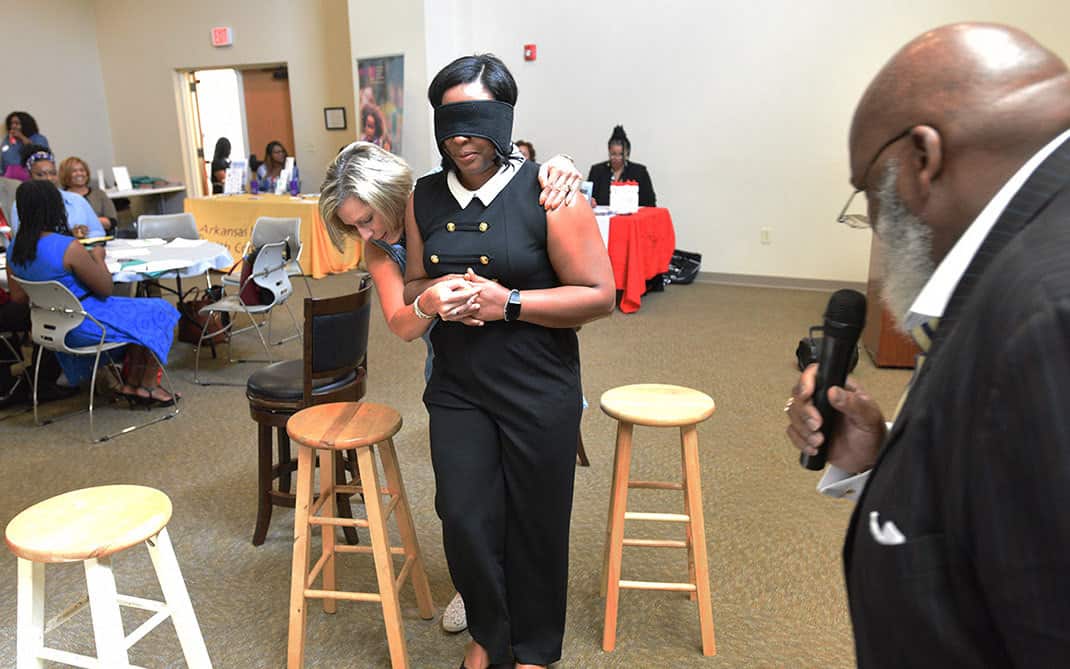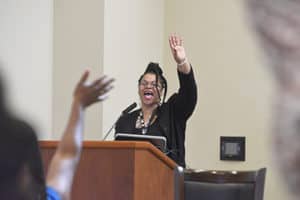FAITH Summit Draws Leaders to Address Mental Health Disparities
| A blindfolded volunteer stood Sept. 14 at the FAITH Network Summit in Little Rock as people in the audience shouted directions to guide her through an improvised obstacle course of stools and chairs.
The FAITH (Faith-Academic Initiatives for Transforming Health) Network is a collaboration of UAMS and faith organizations in Arkansas. The theme of the summit presented by the FAITH Network was “Reimaging Wellness within the Faith Community.” It brought together more than 150 faith and community leaders, students, educators, social workers, researchers, health care workers and stakeholders to discuss mental health disparities and ways to address them through the faith community.
In seconds, the volunteer was bumping into the furniture as Kenneth O. Young, the presenter who had blindfolded her and set up the demonstration, watched.
After a minute or two of witnessing her struggle, Leanne Lefler, an associate professor in the UAMS College of Nursing got up, went to her, took her by the shoulders and carefully guided her around the stools and chairs from the first one to the last. Applause greeted both women at the end.
Young said that he has used the demonstration 70 times with different audiences and Lefler’s intervention was only the second time anyone had tried anything but shouting advice and words. People are ready with opinions and advice, but too often are reluctant to engage a problem and intervene to help, he said.
The conference was held at the Centre at University Park in Little Rock. Keneshia Bryant-Moore, Ph.D., R.N., led the effort organizing the summit. She is an associate professor in the Department of Health Behavior and Health Education of the Fay W. Boozman College of Public Health, and team lead for the FAITH Network.
Young’s wife, Krishna Young, Ph.D., was the keynote speaker.
“If we will come together in the faith community and work together fervently, consciously, cohesively and comprehensively for the same purpose with care and concern, then unprecedented transformative health can be fulfilled and health disparities and inequalities diminished,” Young said.
Krishna Young shared with the audience her views on how faith communities can engage, educate and effect positive change to achieve improved mental health for people struggling with mental illness.

Kimberly Bell discusses ways in which the faith community can help people struggling with mental illness.
Kimberly Bell, a licensed clinical social worker, spoke about the specific things churches and faith communities can do to help. Bell is a therapist and liaison for the Sober Living Inc. Veterans Program.
“Research shows that people who combine faith with their treatment have a much better outcome, Bell said. “If the research says that and we start showing that, then success will follow. However, sometimes the church can be the barrier.”
Growing up in church as the daughter of a minister, she said too often she saw congregants and others ignore individuals with mental health and behavioral issues. People of faith first have to remove the stigma associated with mental illness, and then realize they can’t wait for divine help.
“Mental illness is not the devil and it’s not a spirit,” Bell said. “You can’t all the time pray it away. Could it be a therapist is the prayer answer?”
The church needs to be a place of “safe transparency” where someone can openly seek help without judgment from others, she said.
With that barrier removed, a church can be an important venue in which support groups can meet and peer support can take place, Bell said.
Finally, she recommended that each church select members of their faith community to provide assistance and information about resources, counseling and treatment.
“Identify three or four people in your church who are mature and will be confidential who will be a resource connector,” Bell said. “Handing someone a card is not the answer. That card will go in the trash. If you have a connector who will call and will sit there with them on the call together, these are things we can do in the faith community that makes treatment accessible.”
She closed by asking members of the audience to resolve not to neglect their obligation to help and be a real resource for people with mental illness.
The summit included a panel discussion with mental health professionals and pastors and a presentation on how to develop an action plan to address emotional wellness.
Sponsored by the UAMS Translational Research Institute and the Arkansas Minority Health Commission, this conference is funded through the Patient-Centered Outcomes Research Institute (PCORI) Eugene Washington PCORI Engagement Award. Collaborators on the conference were Baptist Health, the Arkansas Foundation for Medical Care, and the Arkansas Department of Health.

